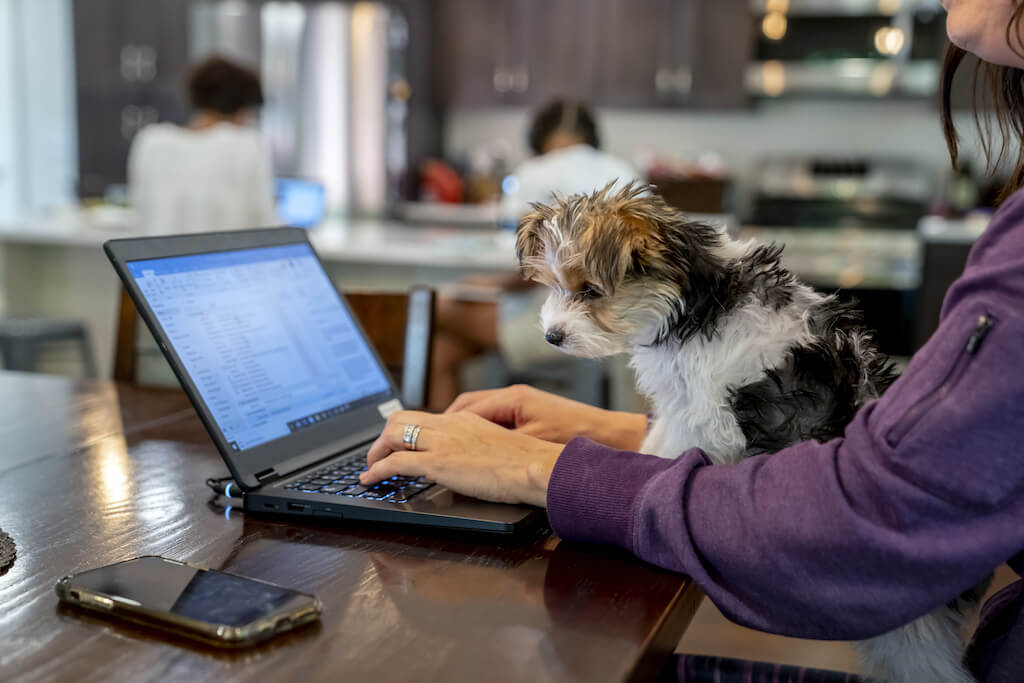Day #748,634,432 working from home, 8:15am: I have my usual morning coffee chat with my dog before I settle in at my desk to get to work. While he’s not the chattiest companion, like many extroverts out there, I do what I can to expel all this pent up social energy I have.
While the switch to remote work has been a silver lining for many, the mental and emotional toll of the pandemic is real: a study led by Boston University researchers found that depression symptoms among US adults has more than tripled since the start of the pandemic.
Introverts are struggling with remote work
You might assume as I did that perhaps the introverts working remotely would be faring better during this extended quarantine life, but the numbers are surprising:
According to a survey by Greater Divide, a Virginia-based research firm, those identifying as extroverts were actually less likely to experience mental health issues as a result of quarantine versus their more introverted counterparts.
And while many recent articles make it seem like introverts are living their best lives while working from home, some data shows that this is not necessarily their ideal long-term workstyle. A survey by Tribe found that, “Interestingly, introverts were 13% more likely than the group overall to say they’d prefer to go back to the office full time after the pandemic.”
Confused yet? Same.
Susan Cain, author of “Quiet: The Power of Introverts in a World That Can’t Stop Talking,” has some potential explanations. In an article by The Wall Street Journal, Cain says that uncertainty can be harder on introverts: “Introverts are used to retreating to a home space where they have independence to control schedules and routines.”
For parents without childcare options or people sharing limited spaces with roommates, the chaos of trying to balance work and life especially in the early days of the pandemic was overwhelming. The health risks, ever-changing policies and data around COVID-19, and uncertainty of job or financial security only add to the lack of control many of us were and are feeling.
Introverts might also be feeling more disconnected because extroverts tend to have larger online social networks, according to Christopher Soto, Professor of personality psychology at Colby College. "This may make it easier for them to stay socially connected, even while stuck at home during the current crisis.”
Finally, if you feel that Zoom meetings and video calls are exhausting, you're not the only one. Thea Orozco, author of "The Introvert's Guide to the Workplace suggests that, "While convenient for remote meetings, video calls can actually be more draining on introverts than real-life interactions." Without nonverbal cues which help a more natural flow of conversation, video calls force participants to exert more energy to pay attention and understand when someone is done talking. This dynamic also makes it difficult for introverts who need to pause and collect their thoughts as they talk because they're more likely to be interrupted.
Routine, reflection, and order: a few more casualties of COVID
In addition to the loss of “normal” work routines and social interactions, many introverts have lost their favorite quiet spaces to take their much-needed alone time. With lockdown blocking access to these spaces, introverts are losing the ability to partake in many of their favorite solo hobbies.
In the same Wall Street Journal article, Elias Aboujaoude, a clinical professor of psychiatry at Stanford says, “When introverts go out into the world, their focus may be more on observation and reflection.”
Just as extroverts are missing their social gatherings and facetime, introverts are now often cut off from the time, spaces, and sometimes sources of inspiration they need to recharge.
The takeaways
Flexible workstyles are more important than ever. During this extended lockdown period, offering more room for your team members to adjust to whatever environment they need to do their best work is vital. Whether it’s enabling flexible hours for parents juggling distanced learning for their kids, providing a work-from-home stipend so they can set up better workstations, or scheduling an additional PTO mental health day for your team, find out how your team is doing and how you can help them during this time.
Remote work experts Dave Landa, Kintone CEO and Megan Dilley, President of Remote Work Association, discuss what leadership looks like in a remote work world in this webinar: Kintone Transformation Talks: Past, Present, and Future of Remote Work.
Many of our introverted friends and colleagues are struggling much more than they appear to be. Providing opportunities for your team members to connect with each other outside of work topics (asynchronously if possible) can help your people feel connected even when they are apart. Read more about how we stay connected at Kintone: Kintone’s Secret Weapon for an Engaged Remote Team
When you’re remote, the collaboration tools you use matter 10x more. Lockdown is a balancing act for a lot of people, so productivity and efficiency are more important than ever. Instead of stringing together disconnected software tools like Slack, email, and Excel, centralize your processes and communication so that your team can spend less time searching for info and more time being productive. Learn more by watching our webinar: How to Build a Better Remote Work Experience With Less Software.
About the Author
Euna is a Senior Content Specialist at Kintone. She holds a BA in English from the University of Michigan and has a thing for words, food, and travel.











